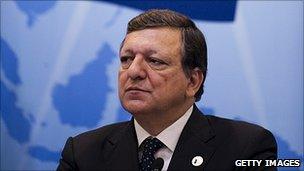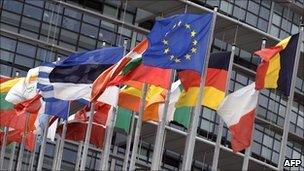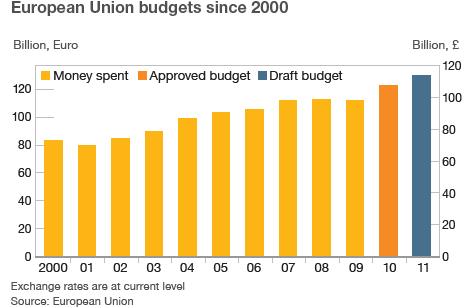Barroso deplores failure over EU budget
- Published

Mr Barroso said many EU programmes would suffer from the budget debacle
The European Commission president says a few EU member states "dealt a blow" to Europe by blocking a deal on the bloc's 2011 budget.
"A small number of member states were not prepared to negotiate in a European spirit," Jose Manuel Barroso said.
Correspondents say the UK and some other countries rejected Euro MPs' demands for pledges on future EU funding and on the parliament's role.
In his criticism Mr Barroso did not name the countries concerned.
The talks ended in deadlock late on Monday, making it likely that the budget will be frozen at this year's level.
"I'm extremely disappointed... a solution should have been possible last night," Mr Barroso said.
"Those that think they have won a victory over 'Brussels' have shot themselves in the foot. They should know that they have dealt a blow to people all over Europe and in the developing world."
Race against time
The European Commission now has to draft a new budget, but if it is not adopted by January the EU will have to work with a budget month-by-month. The allocations will be based on the 2010 settlement.

Governments are tightening their belts - and want the EU to do the same
UK Prime Minister David Cameron had called for a budget freeze before his acceptance last month of a maximum budget increase of 2.9%.
Commenting on the failed budget talks, the UK Economic Secretary to the Treasury, Justine Greening, said MEPs had "wanted to agree extra powers for future budgets, on terms which had no place in a negotiation on the 2011 budget".
"This is something the UK, and other member states, would simply not agree to. We tried to get a deal but, in the end, no deal is better than a bad deal for the UK taxpayer."
MEPs blamed government diplomats - the EU Council - for the breakdown.
"The diplomats around the table are not willing to have a dialogue," said Polish MEP Sidonia Jedrzejewska.
Bigger debate looms
MEPs say they are willing to accept the EU governments' wish for a 2.9% budget increase - lower than the 6% that the parliament had voted for.
But MEPs want their role in setting future EU budgets to be clarified.
The discussions are particularly sensitive ahead of a bigger debate about the EU's 2014-2020 finances. Hard bargaining is expected in big spending areas such as farm subsidies and the "cohesion" budget for the EU's poorest regions.
Speaking after the talks' collapse late on Monday, parliament president Jerzy Buzek said "the intransigence of a few member states in the Council undermines the confidence of our citizens that the EU is working effectively".
MEPs argue that the Lisbon Treaty gives them an equal say in budget discussions with the 27 member states' governments, but the procedure for this is not clear.
The European Commission drafts the budget, but that is only the first stage in a long negotiating process. The Commission, like the parliament, wanted the budget increase to be 6%.
Monday's Conciliation Committee talks involved 27 government officials from the Council and 27 MEPs, representing all the EU member states.

- Published11 November 2010
- Published10 November 2010
- Published20 December 2012
- Published1 November 2010
- Published28 October 2010
- Published13 August 2010